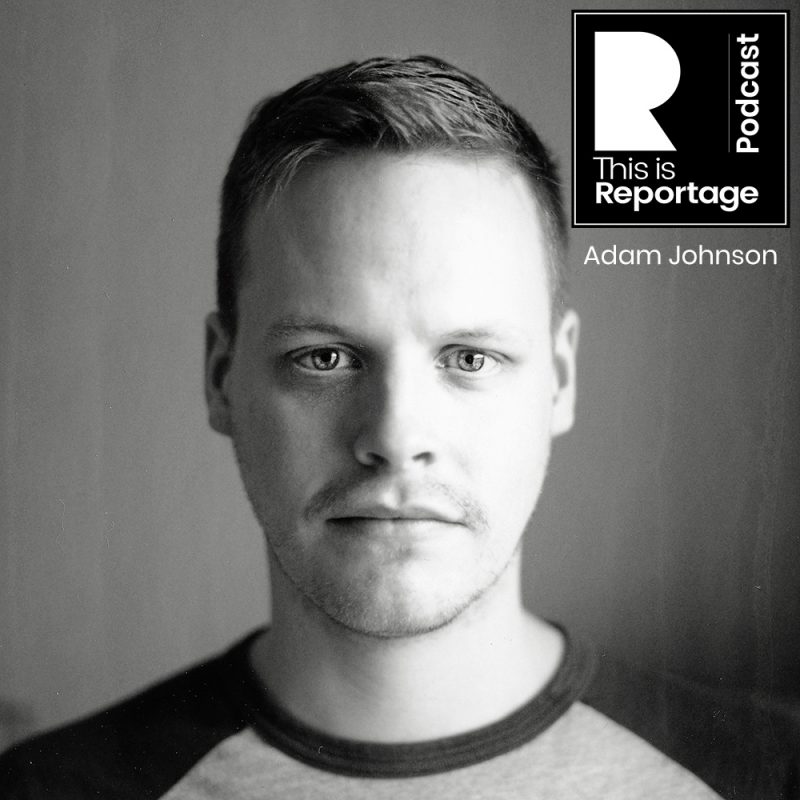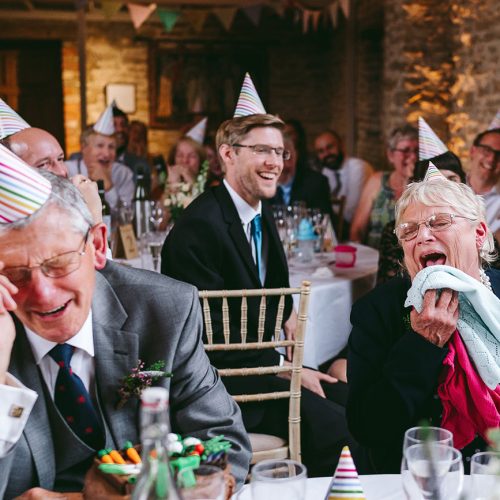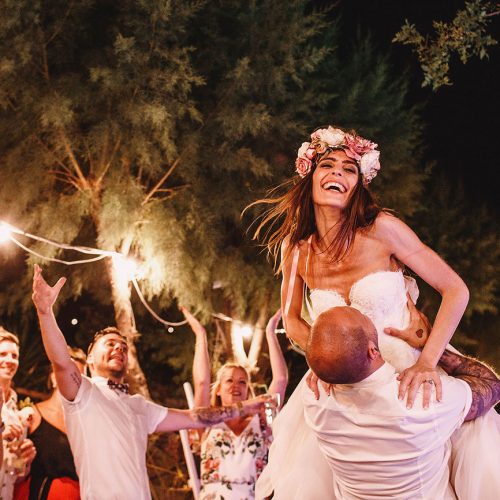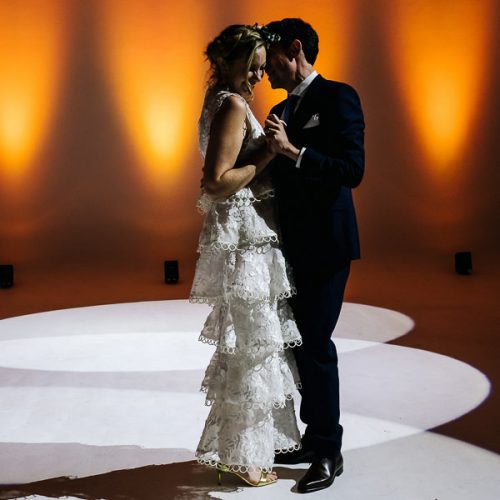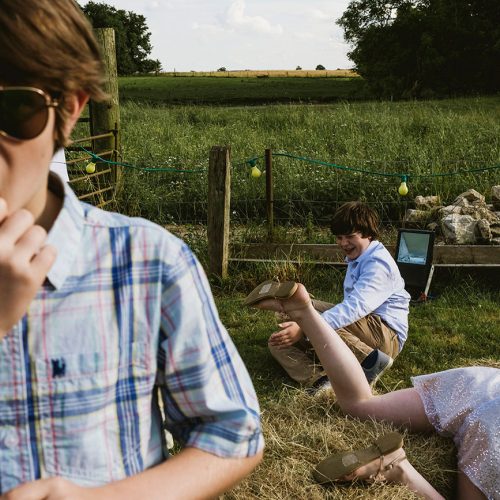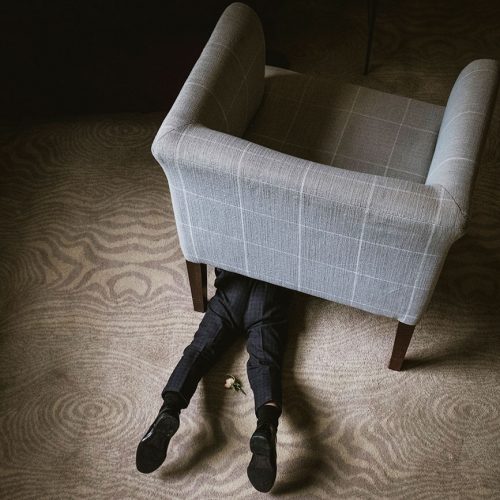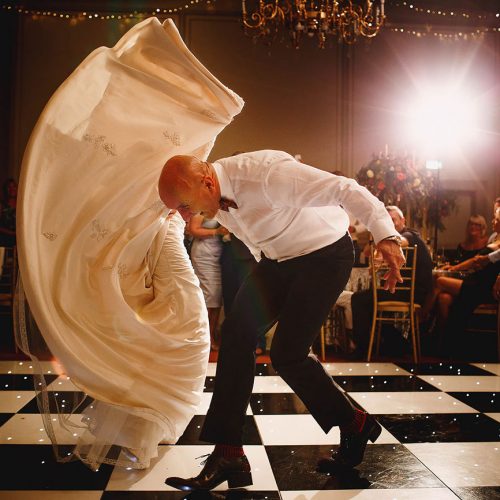Podcast Episode 1: This is Adam Johnson
We’re super excited to be launching the This is Reportage Podcast! We’ll be interviewing some of the world’s very best wedding photographers, delving deep into their lives and careers. Expect lots of brilliant wedding photography advice and tips to be shared, as well as great insights into what makes them tick, how they broke into the industry, anecdotes and life-stories, favourite films, most useful pieces of software, whether they love romantic comedies, and much more…!
We kick off with an absolutely brilliant photographer, based in the UK: Adam Johnson. One of our original TiR judges, Adam has shot weddings in over twenty different countries (something that we go into in depth in his interview, including how he got his very first destination), has won virtually every award under the sun (including no less than six TiR awards, and being named best overall photographer in England at TWIA), and is also a co-founder of the excellent NineDots.
Adam talks about so much in this podcast, including:
The VAT Threshold, stress, what the ‘R’ stands for in ARJ Photography, his very first paid wedding, ‘The Wedding Photography Blueprint’, coding his first website in html, how he made the most of online marketing, not having a boss, being a wedding photographer Dad, what makes him happy, Manchester United, Nine Dots, spawning a community, which day he would choose to live over and over again, shooting weddings in over 20 different countries, how he got his first destination, how a Twitter DM impacted his career, how he’s a terrible cook, shooting fireworks, his past life as a football referee, being spat in the face, coping with nerves, awards, Ross Harvey’s ‘different’ mind, what makes a good wedding photographer, empathy, ‘feeling’ the wedding, creativity, automation and software tips, Four weddings and a Funeral, Stephen King, and more…
You can listen over on iTunes (where we’d absolutely *love* it if you could subscribe and leave us a review!), on Spotify, or within this post by clicking below. For those who prefer to read, we’ve also transcribed the entire interview below. Thanks so much to Adam for this interview, and make sure you subscribe to our Podcast to get new, weekly episodes, full of wedding photography gold!
Alan Law: Hello, Adam. Thank you for coming onto the show.
Adam Johnson: Alan, it’s great, and thanks for asking me. It’s good to be here. It’s always nice to hear your beautiful voice.
Alan Law: Aww, yes. It’s very not beautiful, but thank you anyway. How’s things? How’s wedding season been coming along?
Adam Johnson: Yeah, things are great. Things are good. It’s been one of my quieter seasons ever. I think I’ve done twenty… I’ve got three left in December, and I think I’ve done about 19 so far. So-
Alan Law: That’s still a lot though.
Adam Johnson: Yeah, for me though, I’ve always averaged between 30 and 40 a year, so it was a conscious decision to cut down this year. It’s been a good decision.
Alan Law: Okay. Why did you make that decision specifically? Any specific reasons?
Adam Johnson: Yeah, a few. Would you like me to tell you them?
Alan Law: I think that would be very good.
Adam Johnson: Well first of all, I felt like I was beginning to work myself into the ground a bit. I was spreading myself far too thin, in general in life and in work. I was VAT registered, so I wanted to … Well, I didn’t want to necessarily, but I knew that by de-registering from VAT and giving myself that cap of income, I was going to have to restrict my weddings. I knew that I was getting into that zone of VAT where I far enough above the threshold that I was earning enough to make it worth it. So it made a lot of sense to de-register and to kind of give myself that cap. But in doing that, it’s meant that I’ve had to restrict my work a bit more.
Adam Johnson: I also wanted more time to enjoy myself, and also to work on NineDots, which maybe we’ll talk about in a bit.
Alan Law: I think we will. Now that’s interesting. The VAT threshold thing I think is a thing that we all think about from time to time. What was it like when you were VAT registered then? Did you feel extra pressure or …
Adam Johnson: I think when I first registered with VAT, it felt like an achievement. It almost felt like, “Wow, I’ve reached that level of turnover in my business that I have to register.” It almost felt like a badge, which now thinking back seems stupid. But yeah, I thought, “Well, it must be great that I’m earning that much money that I need to register with VAT, so well done, me.” But then I probably did have two years after that where I was definitely … I was earning significantly over the threshold and significantly over enough that I was definitely making a lot more money by being VAT registered. But it’s the double-edged sword because to be that far above and to stay that far above, I was having to just take on everything that came in and do every bit of work. If you’re going to register for VAT, you have to stay 30 grand above the threshold to make it worth it in any way, so that’s a heck of a lot of extra work to be doing just to stay up there.
Adam Johnson: So yeah, it did become a lot of pressure in the end. It became a lot of pressure to stay above it. Because if you drop into the zone of … So, the VAT threshold, I can’t remember, is 85, I think.
Alan Law: Yeah.
Adam Johnson: If you’re then in the turnover zone of between 85 and 105, you’re just working to pay VAT. That extra work you’re doing is just to pay the VAT. So you’ve got to be well above that just to start making money again. I can’t remember; I worked it out that the difference between the profit of staying under 85k turnover is the same as the profit of being 105k turnover with VAT. So-
Alan Law: Oh, man.
Adam Johnson: It’s crazy. Yeah, it did become a lot of extra pressure. It felt like a huge weight off my shoulders when I’m de-registered and-
Alan Law: Yeah, I bet.
Adam Johnson: That’s why looking back it felt ridiculous that I saw it as an achievement that I was able to register.
Alan Law: Well, I totally understand it though. A lot of things … Something like that is an achievement, really, in life. Isn’t it? A lot of people say you shouldn’t have kind of ceilings that stop you. But I think most people that I’ve heard that have gone VAT registered, they’ve de-registered after a few years. I think for me it would be too stressful, I think.
Adam Johnson: Yeah. I mean, stress is one of those things as well, isn’t it? You don’t always know what’s making you stressed until you get rid of that kind of root cause. For me, de-registering from VAT, honestly it felt like … I don’t know. That felt like the achievement. It almost felt like de-registering was the achievement in the end, but I had to go through that pain of the pressure of earning all that money just to get to that point. So I guess we learn those lessons as they hit you in the face.
Alan Law: That’s true, and that’s cool. That’s really interesting though; it really is.
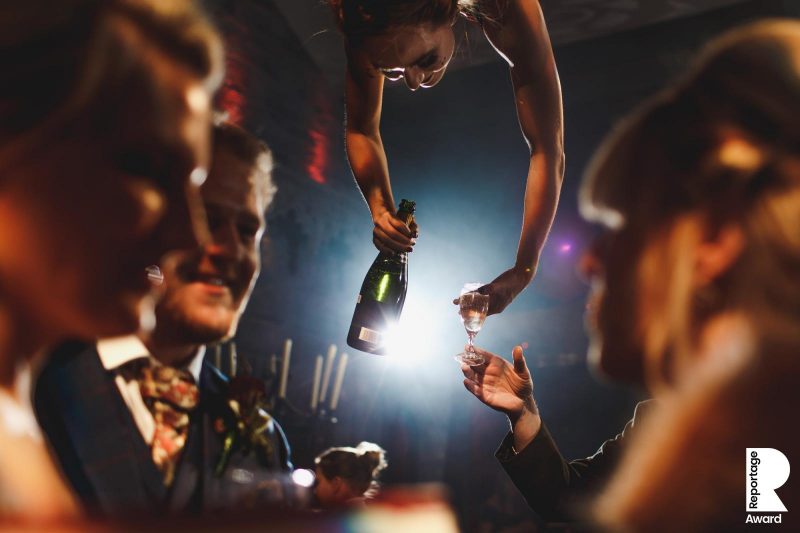
Alan Law: So, I’d like to go onto probably the biggest question that everyone will be wanting to hear. What does the “R” stand for in ARJ Photography?
Adam Johnson: You could’ve prepared me for that question; I could’ve come up with something hilarious. But boringly, it stands for Russell.
Alan Law: Russell? Oh, that’s great. That’s a great name.
Adam Johnson: Yeah. It’s … Well, thanks.
Alan Law: Cool, Russell. Yes, my cousin is called Russell, so it’s a very, very good name.
Adam Johnson: Then it is a great name, yeah.
Alan Law: So Adam, I would like you to take us back to your very first paid wedding.
Adam Johnson: Yeah?
Alan Law: You remember it? How were you feeling? Were you nervous at all, or did you just rock and roll up to it?
Adam Johnson: Oh, no way. I mean, so this is February 2010. That was my first ever paid wedding.
Alan Law: Man, that’s a long time ago.
Adam Johnson: Yeah. Yeah, I remember it really well. I had no … Before that, I’d second shot one wedding, and that’s what I’d used to create my portfolio on my website. That was it. That was my only experience of shooting a wedding, ever.
Alan Law: Was it a friend’s wedding that you did the one your portfolio on?
Adam Johnson: No. So, I had a friend at the time … Well, still a good friend. He had a wedding come up and just said did I want to come and second shoot for him? Yeah, so that was the wedding that created my portfolio. I was only a second shooter, so I had no experience going into my first wedding other than second shooting a wedding one time. So-
Alan Law: Straight into the deep end.
Adam Johnson: In the deep end. I remember back then, I’ve always had this just general belief that knowledge is power. So I spent a lot of time in the buildup to this wedding studying everything I could, looking at a lot of wedding photography. I bought a thing on DVD called The Wedding Photography Blueprint. Yeah, I know. It is as hilarious as it sounds, but it was kind of ahead of its time. If you think about some of the stuff that people are doing now; GoPros on the cameras and kind of recording how they approach a wedding. That’s kind of what it was, really. I can’t even remember the photographer’s name, but it was Nick something. Yeah, it basically was somebody filmed him shooting an entire wedding, and it was him talking about how he approached the prep, how he approached the ceremony, how he kind of did portraits and speeches and dancing and all the rest of it. It was a start to finish, fly on the wall almost, documentary and him talking to camera about how he did the wedding.
Adam Johnson: I must’ve watched this 50 times before this wedding. Honestly. I could probably have recited it back to a person. So I went into the wedding feeling like I knew what I was going to be doing, because this blueprint makes you believe that every single wedding is exactly the same and you’re going to come across this and this is going to happen. And obviously it wasn’t like that.
Adam Johnson: But I went into that wedding, and I shot this first wedding February 2010 exactly the way that The Wedding Photography Blueprint had taught me to shoot weddings. It went all right, you know? It was pretty good. I don’t think I did a bad job of that wedding. I think it was a good, solid set of wedding photos. Yeah, I definitely had some issues. I mean, I didn’t know my camera as well as I should have done, probably. So there were a lot-
Alan Law: Was it digital, or film?
Adam Johnson: Oh yeah. Oh yeah, no, it was digital.
Alan Law: Yeah, I don’t know. That was a long time ago, man.
Adam Johnson: It’s 2010, not 1972.
Alan Law: Okay.
Adam Johnson: Yeah, it was digital. So I had started off shooting weddings, I had a Canon 40D. I think my second camera for the first wedding, or first few weddings, was my original ever camera, which was the Canon 400D. So the 40 was fine; the 400 was a terrible little camera, but good for hobbyists and amateurs but yeah, terrible… So I quickly upgraded. But I shot that first wedding, and I was really happy with the set and the couple were really happy with the set. It was probably the rest of the weddings that year that were worse than that first one, but only because I then instantly went into experimentation mode. So every single wedding, I was trying something different. One wedding I would flash on everything. The next wedding I’d be natural light on everything. The next wedding, I’d be everything at 6000 ISO. Every wedding was totally different.
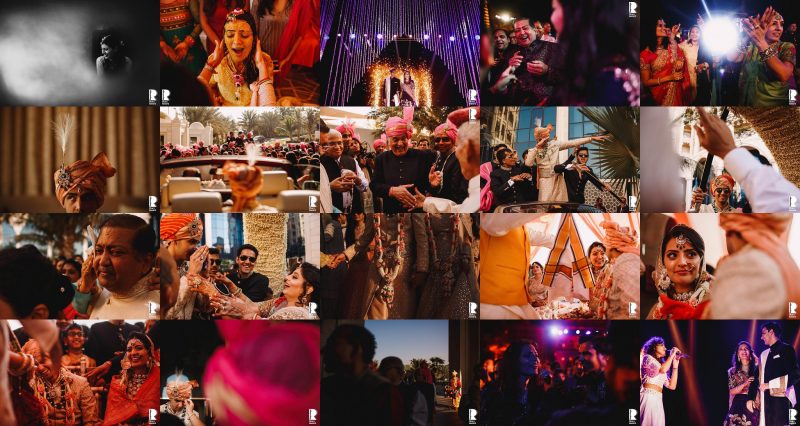
Alan Law: Well, that’s interesting though that you did that straight away. Because I think a lot of people, when they get into it, they are quite regimented in our first lot of weddings. They want to stick to a formula. But you were straight away experimenting then.
Adam Johnson: Yeah, I don’t think I knew that that’s what I was doing. I think I was just finding out about a piece of equipment and going, “Oh, well people use that, so I should use that.” Then I would just use that at my next wedding, and I’d buy it. Because I had a full-time job back then, so I had a lot of disposable income, really, that I could just fritter away on pointless equipment. So I’d buy a soft box one day, and then I’d use it on that weekend’s wedding.
Adam Johnson: Because just to kind of give you a little context of that year … So it was a totally different time in the industry, really. I was working in marketing at the time, so I understood a lot of things that kind of photographers didn’t really know how to do. So we’re talking about before WordPress, before themes, before it was easy to make yourself a website. So I built my entire first website; coded it. I coded my first website in HTML.
Alan Law: Really? Nice work.
Adam Johnson: Yeah. That wasn’t a skill that was available to every wedding photographer back then.
Alan Law: What was your day job then?
Adam Johnson: Well, at that point I was a database programmer, but I worked in marketing.
Alan Law: Okay.
Adam Johnson: But before that, I’d been a website developer and all this kind of stuff. So I’d always been a kind of technical person, I guess. Still am, really but … So yeah, I built a website. But also because I’d worked in marketing for a long time, I understood things like Google AdWords. So when I launched my business, which was September 2009, so whatever, five months before this first wedding, I built my website and advertised on Google. Before I knew it, I had 30 weddings booked for that first year.
Alan Law: Wow, man. That is good going.
Adam Johnson: Because my philosophy always from the beginning … Well, for that first year or so … I mean, I was very cheap. I think I was averaging about 450, 500 pound a wedding.
Alan Law: Wow, are you more than that now?
Adam Johnson: No, same. Same. That’s why I stayed above the VAT threshold, was so-
Alan Law: Yeah.
Adam Johnson: I was happy to do a thousand weddings a year. No, I mean … Yeah, so the whole thing was that I knew I wanted to do a lot of work very quickly, because I knew that I wanted to make this a full-time career. I didn’t want to build up to that over three, four, five, six years. I wanted to do a lot of work very quickly, find out what kind of photographer I was, and make it work. So, shot the first wedding ever February 2010, and I was full time by the summer of the following year. So it wasn’t long afterwards.
Alan Law: No, that’s really quick.
Adam Johnson: That was due to the fact that I was able to exploit the industry, really, that didn’t know how to advertise and didn’t know how to use … Especially online.
Alan Law: With AdWords costing about like 5p a click back then.
Adam Johnson: It wasn’t much, yeah. I mean, I was advertising I think on pretty generic terms as well, like “Cheshire wedding photographer.” Maybe paying, I don’t know, it was under a pound a click, so it wasn’t much money.
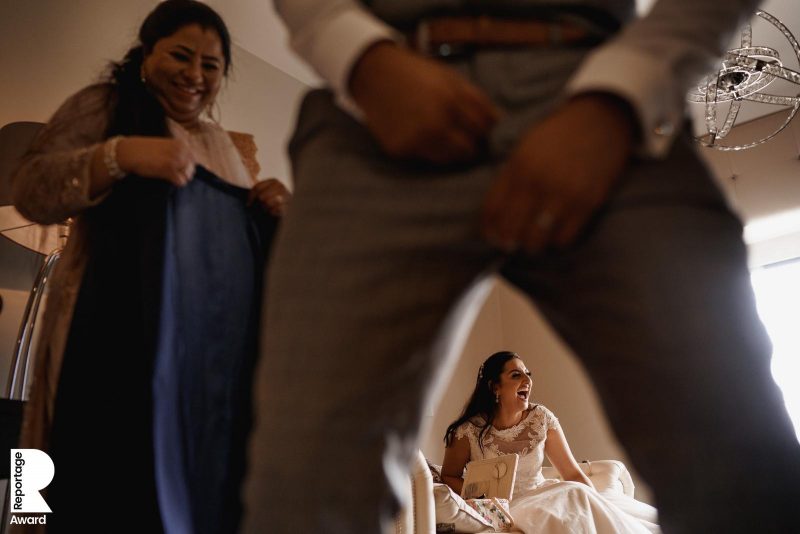
Alan Law: Yeah, different times now. It’s interesting you said that you knew straight away that you wanted to do this as a career. What was it about the wedding photography that just pulled you in? Why did you know you really wanted to do it?
Adam Johnson: I’m not sure if it was anything about wedding photography. It was more that I just didn’t want to have a real job and a boss anymore.
Alan Law: Right, yeah.
Adam Johnson: Because that never worked for me. I was good at my jobs, but I wasn’t a very good employee. Funnily enough, I was at a wedding last weekend as a guest for the first time in ages, and one of my … This wedding was for an old work colleague who’s still a great friend, and he’s actually a wedding photographer himself. He’s the guy that I second shot for just before I shot my first wedding.
Alan Law: Oh, cool. That’s cool.
Adam Johnson: So it was his wedding last weekend, and one of his guests was mine and his old boss from one of my old jobs. The wedding photographer on the day, Neil Redfern, he was sitting on our table at dinner with me and my old boss. He said to my old boss, he said, “What was Adam like as an employee?” Without hesitation my old boss said, “An absolute pain in the ass.” He wasn’t even joking. Didn’t even try and sugarcoat it. So yeah, I know I wasn’t a very good employee. I didn’t enjoy having a 9 to 5. I didn’t enjoy the constraints on my life of having a 9 to 5, especially once I had children. I didn’t like having to ask somebody if I could have a day off to look after them if they were ill. I didn’t like having to ask them if I could go to a sports day. You know? All this kind of stuff was-
Alan Law: Yeah, definitely.
Adam Johnson: … instantly felt like a problem in my life. So once our first baby went to nursery, that’s when it really hit me, really. Because somebody else was getting to spend 50, 60 hours a week with my child and I was having to be at a job. I was getting to see him when he was grumpy in the evenings, and I was getting to see him obviously at the weekends. But I knew that I had to change something because I just wasn’t happy with that.
Adam Johnson: The only thing I had at that time as a hobby was photography. I had a camera and I could take a nice picture of an apple sitting on the kitchen work surface, so I thought I was a great photographer. So that was the only option, really. I thought, “I’m going to need to quit my job and not have a 9 to 5 day job to have the kind of life I want to have. The only thing that I can think to do is be a photographer.” So it wasn’t like this was a thing that built up over years and years. I didn’t used to develop black and white film with my granddad in his garage or anything romantic like that. It was very much a, “I don’t want to have a job anymore. What can I possibly do? Oh, I’ll be a photographer.”
Adam Johnson: So that was it, really. There’s no long, beautiful Hollywood story of how it all got started. It was just I was a terrible employee, didn’t like having a boss, and didn’t like having set hours in an office and all the rest of it.
Alan Law: That’s really interesting, though. Yeah. I mean, I was similiar actually. I was awful working for other people. So yeah, I totally relate to that.
Alan Law: Now as a wedding photographer yourself with kids, what’s that like being a wedding photographer dad? I mean, there are so many benefits that I see. How’s it working out for you?
Adam Johnson: Yeah. I mean, I think the one thing that I’ve been kind of lucky with is I’ve pretty much been a wedding photographer their entire lives now. It’s just felt like it’s very normal. So I know a lot of people especially struggle with … Maybe they are a photographer then they have children, then there’s the issue of they’re not around at weekends and all that kind of thing. I’m just very used to that, so I love being able to be here when they go to see them off to school. I’ll take them to school in the mornings. I love being at home when they get home from school. I love that they don’t have to go to after school clubs, and we can just go to sports day and we can just help out with school if we need to, and all the rest of it. So to me, the whole … To me it’s perfect. It’s perfect job having kids. Yes, I’m away a lot of weekends and sometimes that has an effect on family life because Sophie, my wife … She takes care of the kids most of the time because I do … Even though I’m at home all week, I’m a bit of a workaholic, so I’m spending most of my time still working. But I think it fits perfectly and I wouldn’t change anything.
Alan Law: That’s cool. Yeah, definitely. I’m going to change tacks slightly. So, first thing or things that come to your mind: What makes you happy?
Adam Johnson: My word.
Alan Law: Your word makes you happy?
Adam Johnson: No, I said, “Oh, my word.” That’s a very deep question to go to. I mean, I don’t know really. Watching Man United play football makes me very happy.
Alan Law: Really? Does it though?
Adam Johnson: It does. You know what? I feel like I’m happiest when I’m able to just stop thinking about everything. There’s certain things like going and watching football that help me just shut off and just be totally into the thing that I’m doing.
Alan Law: I think that’s so important.
Adam Johnson: I’m generally quite a happy person, I think. I think some people might laugh a little bit at that, because I have this reputation of being a grump. But I don’t think I am a grump. I think I am generally quite a happy person. Playing tennis makes me happy. I mean, there’s a lot of things that make me happy, really. I don’t know; I don’t want to say anything too cliché.
Alan Law: Well no, it’s good, I think. It’s important to have things that clear your mind like that as well. I’m surprised you mentioned Manchester United though, because oh man. Man, isn’t that stressful? No, not stressful?
Adam Johnson: The thing is, my family have always been Man United fans, really. My grandad was a Man United fan, my great grandad was I think, my dad was. That’s the reason I’m a Man United fan. Yeah, I mean, it’s not the heyday anymore. But I still … I just love it. I’m a die hard Man United supporter, and I love going to watch them at Old Trafford win, lose, or draw. Obviously I’d much prefer to win. I don’t get anywhere near as down as I used to when they lose because…
Alan Law: Because you’re so used to it.
Adam Johnson: Exactly. I’d spend a lot of my life down. But I mean, a lot of things make me happy, really. It’s mainly little things that make me happy. My kids make me very happy.
Alan Law: Yeah. No, that’s cool. But the big question, I guess though, is who is better: Manchester United or Birmingham City?
Adam Johnson: It’s a huge question. I mean, that’s an hour long debate in itself, isn’t it?
Alan Law: It is, it is. We haven’t got time, unfortunately.
Adam Johnson: No, because obviously I love you and I love Sam Docker, I’m not going to have that debate.
Alan Law: Because there’s no debate to be had. There’s no debate to be had.
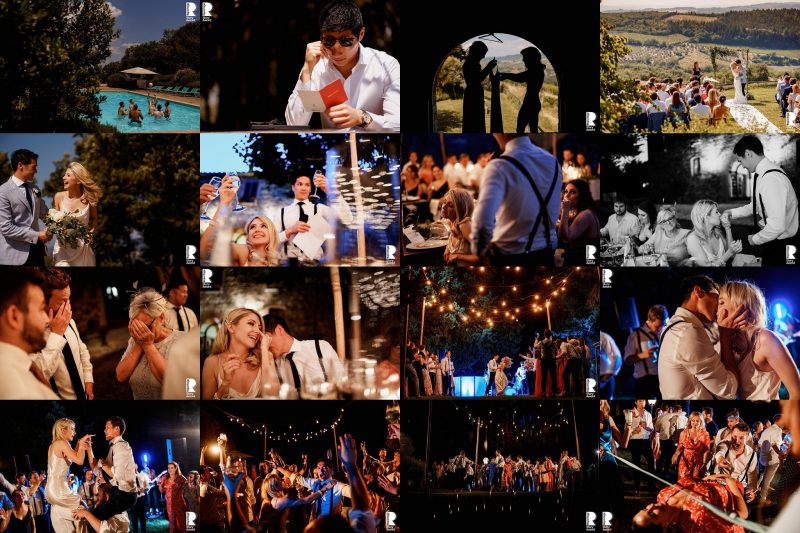
Alan Law: But okay, okay. We’re going to switch from football in case we alienate too many people. So you mentioned it earlier about NineDots, so you’re obviously one of the founders of NineDots. For anyone who doesn’t know what it is, but I’m sure everybody does, but can you just explain what NineDots is and how it came about?
Adam Johnson: Yeah. I mean, so we founded NineDots in late 2014. There was four of us at that point. There was me, Andy Gaines, Rahul Khona, and Mick Shah. It was all Mick’s idea, really. So he wanted to do a workshop that was collaborative. So, four people all teaching the same thing, really. Rather than just a workshop with four different speakers. Four people teaching together; four different photographers. We weren’t friends by then; this is the whole weird backstory of NineDots. We weren’t even mates or anything. It was just a very random collection of four people. I think Mick first asked Rahul, then the two of them agreed to ask Andy Gaines, and then the three of them to ask me. So it was this kind of weird concoction of four different photographers who didn’t know each other in real life. “Real life”; I don’t know what I’m talking about. We came together to teach this first workshop, which we did in February 2015. We did two back-to-back workshops. Then straight after that, we devised the NineDots Gathering, which is now about to be in its fifth year. So that’s a conference that we run every year in London with speakers from all over the world. You’ve spoken there, Alan.
Alan Law: Which is amazing. Yeah I mean, I love it. I’ve been every year. I love it. I can’t wait.
Adam Johnson: I know. We love having you. So yeah, we did the workshops then we did the gathering/conference. We don’t like to call it a conference, but essentially that’s what it is. That’s what we did. For 2015, we did the workshops, conference. 2016, we did the workshops and the conference. 2017 again, 2018 again. Then last year, again, 2018, we changed tack a little bit because … Mick had moved on by this point. Mick became a videographer and went on to do different things, so he stepped back from NineDots and left it to Andy, Rahul, and myself. We did some workshops the beginning of last year. Then middle of last year, we changed tack and turned it into an online membership system.
Adam Johnson: So, it was getting difficult to synchronize our diaries often enough that we could run workshops together. Also, we wanted to reach more photographers than we were reaching with the workshops. So with the workshops, we were reaching 10, 15, 20 at a time, and we wanted to do more, really. So we built an online membership system where we now create online videos and online content. We do some awards and critiques and have a really cool community behind it.
Adam Johnson: So, it’s really now … The whole point of it is that we’ve always been really passionate about raising the standard in general of wedding photography, and raising the profile of wedding photography in the UK as well. That’s what really the gathering was all about, because nothing like that existed back then. We also want to make it feel like, as a wedding photographer, which is quite a solo, lonely job at times, to make it feel like people have kind of people that they can turn to and a supportive network of other wedding photographers to help them out.
Alan Law: Yeah, and you’ve definitely built that. I mean, just from firsthand seeing, and just the Facebook group as an example. People asking questions all the time and the amount of support that people give there; it’s a brilliant community you’ve made.
Adam Johnson: Oh, cheers. Yeah I mean, it blows my mind that that’s what … That was never … We didn’t set out on day one to build an amazing supportive community of very cool people. That was kind of a byproduct, but it’s the best bit of NineDots. The thing that we’re most proud of with NineDots is that community that it’s spawned.
Alan Law: Yeah, totally get that.
Adam Johnson: Yeah.
Alan Law: And the Gathering itself; people, if you haven’t been, is just brilliant. So as I said, I’ve been every year and absolutely love it. There’s table tennis, which is brilliant as well. Nobody has an ego there. You can just go up to anyone and talk to them. It’s just a brilliant time, really. Really recommend it. Yeah, you’ve built something great there. It is awesome.
Adam Johnson: Should we even mention that you’re the two-time reigning ping pong champion?
Alan Law: You can mention that if you want to. I wasn’t going to, but yeah. I know, I just love table tennis though. It’s great. But yeah, also NineDots … Wherever you’re listening to this, if you’re listening to it from the This is Reportage website link, I’ll put a link to NineDots in there. Really recommend checking it out.
Adam Johnson: Thanks, brother.
Alan Law: Although you sell out all the time though so quickly anyway. But yeah, people need to get on it quickly.
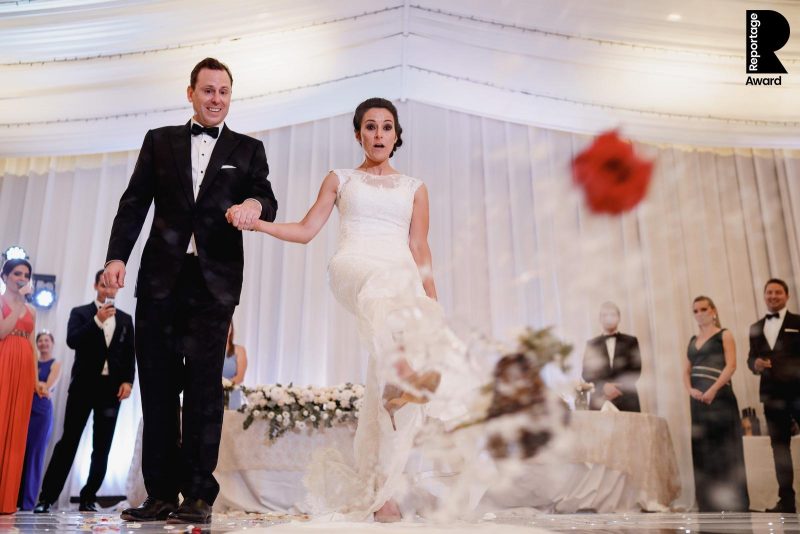
Alan Law: So I was going to ask … Right, yes. A bit left field again. If you could choose one day in your life to live over and over again like Groundhog Day, which is one of the best films ever, which day would it be?
Adam Johnson: It would be … I mean, you’re going to take me back to football. But it would obviously be May 1999, when Man United won the treble.
Alan Law: Would it really, yeah?
Adam Johnson: Yeah, it would. It would. Yeah. I mean, I should probably say when my kids were born or-
Alan Law: No, no.
Adam Johnson: … something a bit more cliché for you. But that would be the day. Yeah. Yeah, definitely.
Alan Law: I remember watching that, actually. I did watch it, and yeah. Manchester United are like my second team because I lived in Manchester for a while, so they’re kind of like my second team. Yeah, that was a good day.
Alan Law: So you’ve shot weddings in over 20 different countries, which is loads, man. Do you count like England, Wales, Scotland, Northern Island…? Ha! That is loads.
Adam Johnson: Yeah, I do. I do count them.
Alan Law: They are different countries. They are. But yeah, do you have a favorite country that you’ve shot in?
Adam Johnson: Oh, man. I mean, I think the country … It wasn’t a wedding. I’ve only been there for an engagement shoot. But the country that’s blown my mind the most is Norway. I’d love to go back there and explore some more. But just a beautiful country, and really lovely, friendly people. That’s the one country that stands out. I mean, Morocco was a crazy experience because it just felt like a totally different culture. This is kind of the funny thing about destination weddings especially, is you don’t really get to experience that much about the country itself often because you just fly in the day before, often shoot the wedding, and fly home the day after. So you’re not really seeing much. I guess that’s one reason why Norway’s probably sticking out for me is because it was an engagement shoot and I felt like we did a bit of exploring and we were able to see the country and kind of explore it and find out a bit about it for ourselves. Whereas weddings often, especially the more long haul destinations, is you’ll be in a resort, which is a bit generic. It’s great to go there, don’t get me wrong. I do love to travel. But I don’t ever feel like I can say I’ve been to that country.
Adam Johnson: But still … I mean, a lot of this … It almost feels embarrassing when you bring it up, but a lot of this saying, “I’ve shot in this many countries”; in a way, it’s just marketing. I’m not trying to gloat about anything. We’re all trying to win clients and win bookings.
Alan Law: Oh, totally. I mean, it’s a-
Adam Johnson: All the kind of stuff that you say, that’s what it’s for really. So yeah.
Alan Law: Yeah, but it is a big deal as well. It does give clients … It’s very valid. It gives them confidence that you’ve shot in all different kind of conditions all over, I think. So it’s very valid. I think especially British people, maybe particularly, we don’t shout about ourselves as much as we should do. So it’s business, so I totally get that.
Alan Law: How did you get your very first destination wedding? Do you remember?
Adam Johnson: I do, yeah. One of my best mates in the world, Chris Mee; he’s a wedding photographer based in Northern Ireland now. But he used to based in Manchester. We were in a Facebook group together; a few Facebook groups together. We’d never really spoken, and then all of a … Again, this is going to feel a bit old fashioned now, but out of the blue I got a Twitter DM from him. All it said was, “Do you want to shoot in the sun more often?” So obviously at this point, I’d never shot a destination wedding. I hadn’t really thought about shooting weddings outside of Manchester and Cheshire, to be honest with you. From the beginning, I always thought this was a local job, you know? You’d start, you’d become a Manchester wedding photographer or a Cheshire wedding photographer, and that’s your region and that’s where you do weddings. So to get this message from Chris was … Well, I didn’t know he meant he was talking about, really.
Adam Johnson: So from that message we had a bit of a conversation and we agreed to meet for pizza, which all the best things happen over pizza. We just decided there and then to become a destination wedding photography duo. So we started a website called “Mee and AJ.”
Alan Law: Oh, really? I didn’t know that. That’s cool.
Adam Johnson: Yeah, we did. We made a brochure and we built a website. This was in the days when SEO … You could kind of get away with bad SEO. Bad SEO almost did you a favor. So Chris was kind of good at all that stuff. He owned the domain name destinationweddingphotographers.com.
Alan Law: Oh, nice. Does he still have that?
Adam Johnson: Maybe.
Alan Law: Sold it for like a million.
Adam Johnson: I think he still has it. But we used that domain name. We built the website on it. We ranked it instantly; I think we were number one or two in Google for “destination wedding photography.” So it was only about three or four weeks after we launched that website; and it was never like a public launch, it was just literally a Google thing, we made it exist on Google; we got an inquiry for a wedding in Kenya. Sadly Chris was not available but I was, and I booked that wedding in Kenya for not very much money, I have to say. That was really the thing that kick started me as a destination wedding photographer. I think having such an unusual destination to begin with as well … Yeah, going back to what you said before, it makes people look at you differently. They go, “Oh my god, he’s shot a wedding in Kenya. He must be amazing.” So it’s all smoke and mirrors, but-
Alan Law: It’s all true though, isn’t it? It’s all true.
Adam Johnson: But really, it went from there. So I met a couple at the wedding in Kenya who then booked me for their wedding in Hong Kong. Somebody else then, who was linked to the bride whose wedding I’d shot in Kenya, booked me for her wedding in Thailand, and then her friend booked me for her wedding in Thailand. It all kind of went from there, really. So I don’t think I’ve ever booked many destination weddings cold apart from that first one. Everything else has been either a referral or something like that. But yeah-
Alan Law: That’s cool, though.
Adam Johnson: That random story of Chris sending me a Twitter DM, “Do you want to shoot in the sun more often?” just led to that whole thing, really. Then I started to build my business around it. I started to make it really obvious on my website that I was a destination wedding photographer, that I wanted to shoot destination weddings, that they were part of my business. Because brides and grooms like to see that. If they’re having a destination wedding, for some reason they want somebody who can shoot destinations … Even though we all know it’s a lot easier to shoot in sunny, beautiful conditions, they still think they need somebody that’s experienced at shooting destination weddings.
Adam Johnson: So yeah. No, it’s been a ride but even though I’ve scaled back a little bit on that now. I don’t really want to shoot long haul weddings anymore. And who knows after Brexit whether we’ll even be able to shoot in Europe anymore, so maybe I’d ridden the crest of that wave.
Alan Law: Cool, cool. Can you tell me something that you’re truly, truly awful at?
Adam Johnson: In life or in photography?
Alan Law: In everything, in anything. Something that you are awful at.
Adam Johnson: Yeah, cooking. I can’t cook. Yeah, I definitely can’t cook. I think there’s lots of things I’m terrible at. I don’t want to turn this into a therapy session, although if I was to sit here and list everything I think I’m terrible at, it would become a therapy session. There’s lots of things I could be better at, and there’s lots of things that I think we … I mean, I guess a lot of us beat ourselves up about, especially being self employed because being self employed, it can turn you into a workaholic and it can get a little bit unhealthy. So there’s definitely times when I feel like I could be a better dad, I could be a better husband, a better friend.
Adam Johnson: In photography, there’s definitely things I’m bad at.
Alan Law: I don’t believe it. I don’t believe it, Adam.
Adam Johnson: There’s things that terrify me. Fireworks still … Shooting fireworks still terrifies me because-
Alan Law: Oh good, I’m glad you added the photographing of them. You’re not just scared of fireworks.
Adam Johnson: No, I love fireworks. Maybe that’s why I’m terrible at photographing them because I just stand there and watch. Then at the end I’m like, “Shit, I haven’t taken any pictures.”
Alan Law: What is a random fact about you that you think most people would be surprised to know?
Adam Johnson: Oh mate, I’m a very boring person. I’m not sure I have any random facts.
Alan Law: No?
Adam Johnson: I used to be a football referee.
Alan Law: Really?
Adam Johnson: Yeah, I was a football referee and I was on the fast track to the Premier League.
Alan Law: Wow.
Adam Johnson: This was in my early … I was about 23, I think, at the time. Yeah, I’ve always loved football, see, but I’ve always been a terrible footballer.
Alan Law: Is that how most referees get into it, if they’re not very good footballers?
Adam Johnson: Well, I think most referees, I think, get into it because they want to be involved in football but just aren’t good enough to play at any kind of level. So yeah, I got into refereeing. I think because I was quite young and quite passionate about it, somebody from the FA had been out scouting referees. Bizarrely, that’s a thing that actually happens. I got this call to say, “Do you want to be fast tracked to the Premier League?” Obviously I was a 23, 24 year old obsessed with football. It was almost like winning the FA Cup. I was training with some Premier League linesman and referees on one night a week.
Adam Johnson: But then it all took a sour turn, really. So, refereeing is a very … Well, as everybody knows, it’s a very thankless task. It was the end of one season and I was refereeing some important cup games and lineman on other cup games. Somebody spat in my face and I just quit refereeing that day and never went back to it, really.
Alan Law: Eurgh, I don’t blame you!
Adam Johnson: Some of it was because I was quite young, so I was an easy target. I think it could be something I would go back to.
Alan Law: Wow, man. That’s an awful experience though as well.
Adam Johnson: Yeah. I mean, well, I’d say it’s character building.
Alan Law: It’s never happened at a wedding, has it? Not when you’ve delivered your photos and-
Adam Johnson: Oh, what are you trying to say? No. But I think stuff like that definitely toughens you up. I was probably a bit of a wimp before I was a referee. I’m still a wimp now, but it’s definitely character building. It definitely helped me with the people side of things.
Alan Law: Yeah, I bet.
Adam Johnson: And just going in cold and trying to deal with people, especially in difficult situations. One of the key things to refereeing is to make everyone feel like you’re everybody’s mate, whatever team they’re on. I think I still take that into weddings now. I still go into weddings and my instant goal, really, is to make everybody feel like they’re my friend and I’m their friend.
Alan Law: Yeah. I mean, were you nervous when you were a referee? Do you still get nervous now with weddings and talking at conferences and things? Or do you not feel that?
Adam Johnson: No, I’m a very anxious person in general. So refereeing, I used to get ill before I’d go to a match. I was refereeing Sunday league and pointless games, but I would still sometimes get sick before I would go and referee a game. I would be terrified and full of nerves just before a game kicked off. But it’s a bit like weddings now. I feel exactly the same, really. Even 10 years in or whatever it is; I still feel super nervous before I go to a wedding. But back with the refereeing and same with photography, as soon as I get started and take a few pictures or as soon as I blew the first whistle of a football match back then, I would feel great. I would feel like I was loving it. That’s exactly the same with photography. As soon as I start taking pictures at a wedding and I remember that I know what I’m doing and I can take a nice picture, I relax into it.
Adam Johnson: But yeah, I think I still get nerves. I definitely get nerves before a wedding, and I still get nervous at certain points of the day as well.
Alan Law: I mean, that’s interesting. Because I think people who are listening maybe … It’s going to be a wide range of people who do hopefully listen to this, but some of them are going to be kind of people who have just started and they’ll be feeling nervous and they’ll be wondering if these nerves do go. It’s interesting for you, so it hasn’t really. It hasn’t for me, either. They haven’t gone. I still get nervous before each wedding. But it has got easier, I think.
Adam Johnson: I think the nerves change. I think you get to a point where you know you’re going to do a good job. You know you’re going to go to a wedding and take good pictures because you’ve got a track record of doing that. But I get more nervous about the people side of our thing than the photography side of it. I want to go and make a good impression on people. I want to be a positive impact on their day. These things make me nervous. I want to do the best job I possibly can. There was a period when I was obsessed with awards and I was winning a lot of awards, and that added another layer of pressure because I felt like I almost had to live up to the reputation. That was a pressure that I had trouble dealing with, actually, for a bit, and one of the reasons I’ve backed away from awards for a good year or two. But yeah, I mean, it never goes away-
Alan Law: What kind of pressure from the awards? What do you mean? Like, you were winning all these things so you felt that all the work that you put out had to be a mega high level? It’s that kind of pressure?
Adam Johnson: No, I think clients pay quite a lot of attention to that. More than I think we realize that they pay attention to it. I was going to weddings and feeling like they were expecting me to create award-winning photography at that wedding. Awards can only ever be a bonus. You can’t shoot for those. You can’t shoot that way. So I remember there was a wedding a while ago; I won’t say where it was or who it was. There was a welcome party, and there was an announcement made that I was the sixth best wedding photographer in the world. All that had happened was that just before this wedding, a set of results had come out for ISPWP. In that particular context, I’d finished six overall, so they made this announcement to all their guests that I was the sixth best wedding photographer in the world.
Alan Law: No pressure.
Adam Johnson: Oh mate, I could’ve just … This was on a beach, and I was just wishing it was quick sand. That’s how I felt at that point. I just wanted to sink into the ground. So yeah, so it just got to a point where I felt like people were wanting me to create award-winning photos. I don’t know; if you’re trying to create award-winning photos, you won’t create award-winning photos. Yeah, the pressure from that … Well, it became too much for me. I’m not very good at dealing with massive amounts of pressure, and I think that’s part of the fact I am a bit of an anxious person. But yeah, I didn’t like-
Alan Law: Who is good with dealing with pressure though? I mean-
Adam Johnson: Oh, I’m sure there’s people. I’m sure there are some people. I remember … I’m sure he won’t mind me saying this. So Ross Harvey, we all know Ross Harvey. I second shot for Ross. This was way back; maybe 2013, I think. A long time ago. 2014 maybe. I met up with him the day before the wedding and we were talking about things like this, like about nerves and all this kind of thing. He kind of said that he doesn’t really feel that pressure or those nerves because he’s just confident that he’s going to do a good job because he knows he can do a good job.
Adam Johnson: So I think everybody’s mind works differently.
Alan Law: Yeah, that’s true.
Adam Johnson: And people are able to, I don’t know, come up with different mechanisms, I guess, to train themselves to be better at dealing with that side of it, that more psychological side of the job.
Alan Law: That’s true. Yeah, and Ross, I guess, does live in a kind of different planet as well to most of us.
Adam Johnson: Yeah, it helps that he’s not human.
Alan Law: Yeah.
Adam Johnson: I obviously mean that in the nicest possible way.
Alan Law: Oh, of course.
Adam Johnson: I have a lot of respect for Ross and the way his mind works especially, and the way that he works.
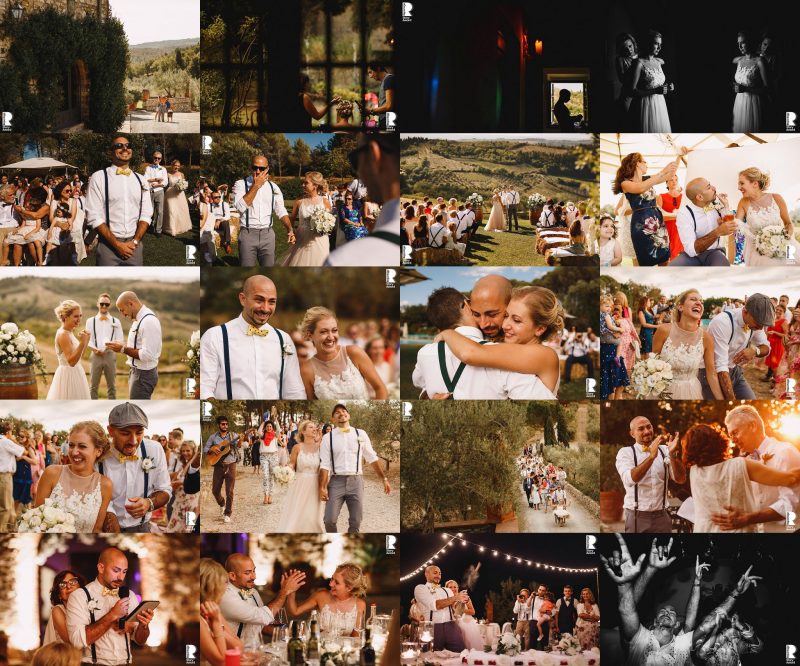
Alan Law: Oh yeah, definitely. Definitely. What, in your opinion then, makes a good wedding photographer? I know it’s quite a general subject. But I mean, what is a good wedding photographer?
Adam Johnson: I think the one skill that a wedding photographer needs is empathy. I think you can’t … I say this really from experience of doing the opposite, really. You can’t go into weddings to shoot pictures just for you. I think if you are good at being empathetic towards the people that you’re shooting, you’ll really feel that wedding. You’ll feel what it needs, you’ll feel the pictures that those people need, and you’ll get a much deeper understanding of those people and their wedding, and that’ll just come through in the pictures.
Adam Johnson: And also, kind of to contradict what I said a minute ago; the more you do that and the more you shoot for them, then you will get opportunities during the day to shoot just for you. So the more they feel like you’re there for them, the more they’re likely to give to you when you’ve maybe got a weird idea or something that doesn’t feel normal. So, maybe a pose in a portrait or whatever it might be. They will give back to you as well.
Adam Johnson: But I think empathy is above and beyond the number one skill that we need as wedding photographers. Way above anything to do with cameras or settings or creativity or anything else. I guess for me, creativity would be second. I think having the kind of creative side to my brain and being quite tapped into that has been something that’s helped me a lot in my career. But far and above, it would be empathy. And also, the more you’re able to do that, the more you’ll enjoy weddings because you’ll feel part of it as well.
Alan Law: That’s so important, isn’t it? To be enjoying it.
Adam Johnson: Oh yeah, massively. There’s definitely been times in my career, and I’m sure you’re the same, when I maybe haven’t enjoyed it as much.
Alan Law: Yeah, totally.
Adam Johnson: That’s either been due to working too much or doing too many weddings and just getting lost in the fog of wedding season, or it’s through losing sight of what we’re really there to do and what weddings are all about. And also things like I was talking about a minute ago, with the awards and the pressure that came from that. Then I started shooting and trying to shoot in a different way, and then constantly disappointed that I’m not creating the kind of work that I want to be creating, and it just becomes a vicious kind of downward cycle at that point.
Adam Johnson: So yeah, empathy all day long is the cornerstone of our job, I think.
Alan Law: Yeah, totally agree. Totally agree. Just last couple of questions now. Do you have one particular piece of software or app that you really couldn’t do without?
Adam Johnson: I don’t know. Lightroom.
Alan Law: That is quite handy, isn’t it?
Adam Johnson: Yeah.
Alan Law: That is quite handy.
Adam Johnson: A lot, really. So one of my big obsessions really is automation. I enjoy automating parts of my business admin mainly, that I don’t like doing, that I find tedious. So there’s lots of little bits of software that I use on that side of things which I couldn’t live without. Xero is a piece of software that I use for my bookkeeping that’s amazing. A little piece of software that I use called Text Expander, so that’s where I kind of store standard responses for inquiries or things like that. So you just type in a shortcut and it puts in your standard response for an inquiry, for instance.
Alan Law: Cool.
Adam Johnson: On my website, I use Gravity Forms because I love the way that you can just have clever little bits of automation within that. So for instance, people might inquire, and depending whether their wedding’s in the UK or Europe or further away, you might send them a different price list. You can set all that kind of stuff up to be automatic within something like Gravity Forms.
Adam Johnson: So there’s probably a lot of little bits of software that I couldn’t live without. Oh, and Pfixer as well. Pfixer’s a piece of keyboard shortcut software for Mac, not for PC. I know you won’t be able to use it, Alan. Where you can set up your own shortcuts for Lightroom on the keyboard. I definitely couldn’t live without that.
Alan Law: Cool, cool. Thank you. That’s all really good stuff.
Alan Law: Is it going to be the final question? I think so, because it’s gone so quickly. It’s mad. Do you love Four Weddings and a Funeral?
Adam Johnson: You know, I’m not sure I’ve ever seen it.
Alan Law: No. No.
Adam Johnson: I’m not sure I’ve ever seen it.
Alan Law: What?
Adam Johnson: I know. Sorry, Alan. I’m not sure I’ve ever seen Love Actually either.
Alan Law: Oh my. OK, ‘delete interview’..! Man, you need to watch them. They’re so good.
Adam Johnson: I know. The thing is, I love movies as well, and I love rom coms and all that kind of type of movie as well. I adore movies, so I have an unlimited cinema card. So going back to an early question is what makes you happy? I love going to the cinema.
Alan Law: Favorite ever film? Favorite ever film?
Adam Johnson: Favorite ever film; it probably would be controversial, again. It’s probably something like Deadpool.
Alan Law: I haven’t seen that.
Adam Johnson: Oh, mate. Well, you can delete the interview then. No, I have … Yeah, Deadpool. Again, it wouldn’t be anything that everybody else loves that’s kind of artistic or … Obviously Shawshank Redemption. That’s in everybody’s top 10.
Alan Law: It is, isn’t it? It is beautiful. Who wrote it? Who wrote it?
Adam Johnson: I don’t know. Tell me.
Alan Law: Stephen King, Stephen King!
Adam Johnson: Oh, Stephen King. So this Friday, I’m going to see The Shining at the cinema because it’s-
Alan Law: Oh, you know, I’ve never seen that actually.
Adam Johnson: No, me neither. So I’m going to see that on Friday because they’re doing a special screening at my local cinema, so I’ll see that for the first thing this Friday because Dr. Sleep comes out in a few weeks and I’m going to see that as well. So it’s kind of the follow up to The Shining.
Alan Law: Oh is it? Oh, I didn’t even know that. That’s cool.
Adam Johnson: Yeah. Yeah. So I do love the cinema, but I’m afraid I’ve never … I don’t think I’ve ever seen Four Weddings and a Funeral.
Alan Law: You’ve got to do it, man. Especially as a wedding photographer now. It’s like, you just have to.
Adam Johnson: I’ve never seen Father of the Bride, either. I’ve never seen any of these kind of big famous wedding-related films.
Alan Law: You’ve got to get on it; you should have a marathon of those wedding films. They are great, though. I love it. I love rom coms and stuff.
Alan Law: But anyway Adam, thank you so much for that honestly. That was really, really great. So interesting, and there’s loads of gold in there. I just found that just really, really interesting. Thank you for your time. It was brill.
Adam Johnson: Cheers, Alan. Thanks for asking me.
Alan Law: Nope, great. We’ll put on the websites kind of links to your site and those various apps you mentioned, and NineDots as well. People, definitely check out NineDots. Go to the Gathering, become a member. It’s honestly brilliant stuff, a brilliant community.
Alan Law: Great, thanks so much, man.
Adam Johnson: Cheers, Alan.
***********************************************************
Here are the links that Adam mentions in the podcast:
ARJ Photography (Adam’s website)
If you enjoyed this Podcast, it would be massively appreciated if you could leave us a review over on iTunes, and subscribe to our show too! Thanks so much – we’ll be releasing new podcasts each week, and your review/rating will really help us to reach as many listeners as possible. You can also find all our other episodes – with transcripts, too – over here, and we’re on Spotify too.
Are you interested in joining us here at This is Reportage? We showcase the very best in documentary wedding photography, with our members receiving lots of benefits, including 60 Reportage Award entries (for great individual captures) and 18 Story Award entries (for a series of 15 – 20 images from a single wedding) per year. Members also receive their own profile with an unlimited number of images/Stories, exclusive discounts/deals on wedding photography-related services/products, access to our members only Facebook group, free invites to our meetups and parties, and much more…
